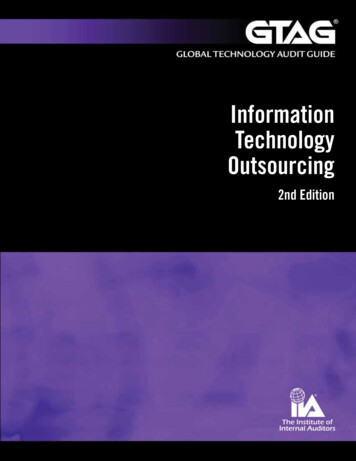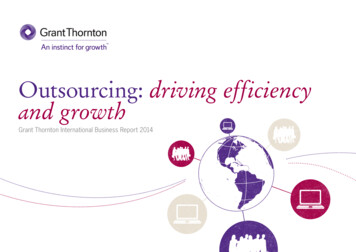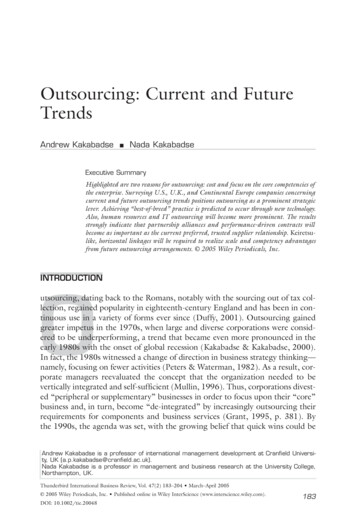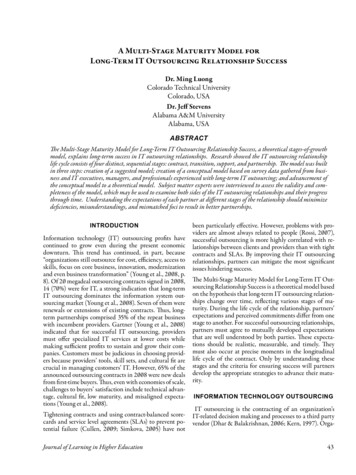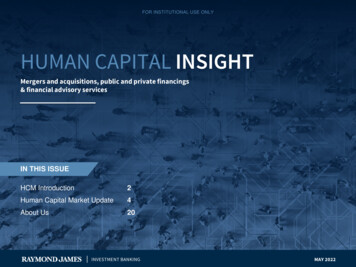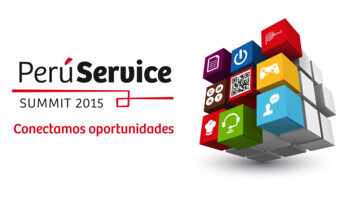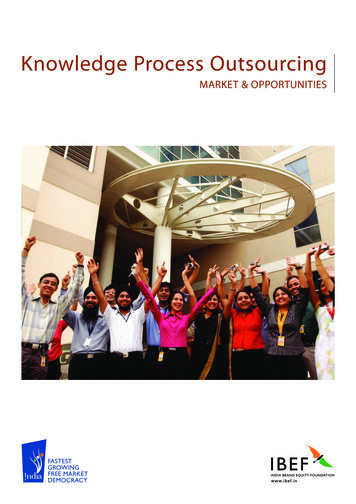
Transcription
special edition 2020SGSS2020 OUTSOURCING
INSOURCING CAN WE GO AGAINST THE TIDE?which puts the spotlight on a topic that lies at the heart of financial players’ concerns: outsourcing. In thisissue, we will use the opinions of experts to look at the challenges associated with outsourcing, as well asthe constraints, misgivings and hesitations, the opportunities it provides and the new types of cooperationthat are emerging within this industry.Outsourcing has today become a natural trend or even a necessity that can be observed in all industries at a certainlevel of maturity. Firstly, for obvious cost-control reasons: in our activities that are subject to regulatory changes,the risk of fraud and cyberattacks, substantial and continual investments are necessary. The notion of criticalsize is therefore a constraint imposed on all players, and notably on banking service providers who will have totransform their offers, digitise them, comply with regulatory requirements, secure their IT Systems and enable theirclients to benefit from these pooled investments. Outsourcing makes it possible to focus on, and allocate effortsand scarce resources to, one’s core activity, and thus to create more and distinctive added value to win greatermarket share. Despite this trend and the market’s infatuation with it, some players are opting not to outsource.For what reasons? If we want to comprehensively address this outsourcing topic, we need to look at the issue ofcontrol, and in particular data control, and not ignore the difficulties that go hand in hand with these organisationaldevelopments, such as the loss of oversight, flexibility and responsiveness. Furthermore, it should not be forgottenthat outsourcing also means learning to forego and accepting to standardise in order to fully benefit from the scaleeffect. So how should these challenges be addressed? By developing essential control processes, but also thanksto numerous innovative responses, sometimes by new players, by new outsourcing methods combined with newoffer models. Beyond traditional forms of outsourcing by delegating, other cooperation initiatives are emerging:collaboration or partnerships between a number of players who combine their strengths to improve marketpractices providing examples of collective intelligence and development. The emergence of new technologies suchas APIs are facilitating collaboration between players. Maintaining an open architecture approach makes it possibleto retain the flexibility that is essential to these new combinations: connection with a number of subcontractors,internal developments versus the use of software packages, integration of external data within one’s IT system. Inthis magazine, we wanted to give the floor to those who are contributing to innovation through the viewpoint offintechs with their fresh and youthful eyes but also more established and experienced players like SGSS. Feedbackon using CrossWise front-to-back offer is hence discussed at the end of this magazine and illustrates opportunitiesto integrate services within outsourcing offers. All in all, this magazine provides a vast overview of opinions andpossibilities for making the most of outsourcing solutions and partnerships. I am sure it will bring to readers’ mindsan experience, an opportunity to rationalise their organisation, or simply provide a window into these outsourcingtrends. In these difficult times, I would like to wholeheartedly thank everyone who has contributed to this magazine,accepted to share their expertise and worked hard to produce it. Its content has been created before the Covid-19crisis and therefore doesn’t deal with its potential consequences both on outsourcing and, more generally, on theinvestment industry. We are well aware this event will have a significant impact on the financial world and this is atopic we will definitely address in our future publications. I hope you enjoy reading this magazine as much as wehave enjoyed putting it together.MATHILDE GUERINHead ofTransformation &Technology DeliverySGSS02Mathilde Guérin began her career at Societe Generale in 1991 and held various positionswithin the investment bank and the Custody Services Department. She participated in theanalysis of all IT and operational aspects of the SGSS acquisition of UniCredit’s securitiesservices in 2005. She was then appointed programme manager for the migration ofPioneer Asset Management’s Luxembourg funds. In 2008, Mathilde Guérin becameGlobal Relationship Manager of Pioneer AM, before being appointed Global Head of Subcustody Network Management in 2011, followed by her appointment as Head of ProductEngineering in 2016, in charge of developing SGSS products and solutions. Mathilde is agraduate of the Ecole des Mines in Saint-Etienne, France.06INSOURCING/OUTSOURCING IS TECHNOLOGYCHANGING THE PARADIGM?08THE EVOLUTION OF OUTSOURCING FOR WEALTHMANAGERS: MICRO BPO1 SERVICES10THE SUBJECT OF DATA FRUGALITY: AN ESG2 COMMITMENTOUTSOURCING A CONCEPT THAT IS RENEWING ITSELF14BEING A SUCCESSFUL INDEPENDENT ACTIVE ASSETMANAGER REQUIRES AGILITY AND A STRONG FOCUS16OUTSOURCING 3.0 IN THE ASSET MANAGEMENT INDUSTRY:CROSSING THE BOUNDARIES FOR DIGITAL TRANSFORMATION18OUTSOURCING: CONDITIONS FOR SUCCESSCOLLABORATION BETWEEN ASSET MANAGERS,BOLDNESS OR NECESSITY?2226SUB-ADVISORY, THE NEW ELDORADO?28BLOCKCHAIN IS ENCOURAGING“COOPETITION” BETWEEN ASSET MANAGERS30BANKS AND FINTECHS: RIVALS OR BEST FRIENDS?32CROSSWISE EXPERIENCEMAXIMISING POTENTIAL THROUGH OUTSOURCED ACD3s(1) BPO: Business Process Outsourcing. (2) ESG: Environmental, Social & Governance. (3) ACD: Authorised Corporate Directors.03
INSOURCING/OUTSOURCINGIS TECHNOLOGY CHANGINGTHE PARADIGM?In a fast-changing business world, the terms “agility”and “flexibility” are somehow absolutely necessaryfor organisations to compete, especially large-scaleorganisations operating across the world.Agile is not only a methodology or a philosophy, butconcretely also means a thorough rethinking of theoperating model, making operations processes smarterand leaner, optimising the organisational structurethrough the allocation of resources to core activities andoutsourcing lower value-adding ones.Until a few years ago, the imperative for organisations wasoutsourcing on various levels: near-shoring, off-shoring,etc. depending on the geography.Among the possible strategies, outsourcing of someactivities was an option assessed taking into considerationthe following drivers: osts - primary aim is cost reduction;nC etup - setup time and ease of knowledge/skills transfernSand scaled according to overall difficulty (geography,etc.); lexibility - intended as flexibility of the local labournFmarket and local works council activities; onitoring capability - the organisation’s ease andnMcapacity of monitoring the possible outsourcer.A particular emphasis was obviously put on the costcomponent, especially on a company’s personnel costs,with the rise of certain areas such as Central and EasternEurope (Poland, Czech Republic, etc.), India and the FarEast (Thailand, etc.).The benefits of outsourcing are, however, now less obviousthan in the past for three main reasons:n t he operating model can be adjusted, reducing costs,also through smart process automation and artificialintelligence;n t he capacity to effectively monitor the outsourcerdefining a robust set of KPIs, along with the solidity ofthe partner, has shown some signs of impracticability;n t he real and concrete possibility provided by theoutsourcer of activating business continuity plans anddisaster recovery programmes in case of unpredictableincidents, as also required by EU regulations, is limited.In this context, some organisations, to mitigate operationalrisk and drive efficiency gains, are also adopting a lighterform of outsourcing that is outcome based and foreseesthe delivery of services on the same platform in useby the client (called Managed Business Services orBusiness Process Outsourcing).All these things are now leading organisations toundertake a comprehensive review of the paradigm,breaking with the natural correlation between flexibilityand outsourcing. Outsourcing is now seen as a possiblecomponent of a larger jigsaw that might also include thepossibility of insourcing part of the business, taking intoconsideration the risks and the possibility of reducing themarginal impact of costs through the adoption of smartprocess automation.Something that in the past would have never been said onany Boards or by any C-suite executives is now a concreteoption to improve the operating model, but it requiresstrict collaboration between the business and two keyareas: HR and IT. Indeed, these last two functions representthe key enablers for rolling out the model in a mid-termperspective.This new approach to transforming the operating modelrequires:n a solid IT team as a business strategic partner oninitiatives where technology acts as enabler, able tofind a way to structurally transform IT legacy and coresystems, while injecting differentiating digital solutionsand being able to deploy a modular applicationlandscape, based on architectures able to exploit datagathered from both internal and external sources;n a fully on-board HR team to assess actual expertise vs.future needs and to roll-out a disciplined programme tocontinuously acquire and develop new skills to boostexecution.New technologies are undoubtedly changing what wasabsolutely unpredictable and taboo over the last twodecades: re-insource part of the production chain. Anew route that can only be pursued by investing in the ITplatform and continuously acquiring and developing newskills.DIEGO BIASINIHead of Middle & Back Office & Funds ServicesGenerali InvestmentsDiego Biasini has been at Generali Investments Holding since 2019, the Service Company part of the Investments, Asset& Wealth Management Business Unit of Generali Group and pivotal to the multi-boutique strategy. Previously he wasthe Head of Business Transformation in Generali Investments after a decade primarily spent in the asset managementindustry as Project Manager in a variety of projects with a clear focus on the review of the target operating model of theOperations and Front Office areas.07
THE EVOLUTION OFOUTSOURCING FORWEALTH MANAGERS:MICRO BPO* SERVICESart advisory, etc.) to their high net worth individual clients. Upuntil now, these clients faced a difficult decision whether tooutsource their operations to traditional banking providers(core banking services, high volumes, standardised services,huge costs) or classical asset management providers (focusedon products such as mutual funds, ETFs, specialised onlyfor some investment services segments, etc.). In addition,some new players have joined the wealth managementarena, increasing the complexity of service: the so-called“Digital Private Banks” started to work within a full digitalprocess in terms of both the relationship with their clientsand investment services offering robo-advisory and AI-basedinvestment strategies.The approach based on BPAAS, as deployed by Adepa, makesit possible to overcome the limitations of a standard outsourcerin the banking and financial sector, defining a new outsourcermodel. The microBPO approach followed by Adepa with itsBPAAS Platform allows Private and Digital Private Banks toswitch on the services selecting the providers (Adepa itselfor another leading company) that precisely matches theirrequirements, leaving Adepa to orchestrate and integrate thetask. In this case, Adepa ensures the right governance of thisenvironment through the use of technology and specificallyselected partnerships. The image below shows how the Adepamodel works to support a Private Bank/Wealth Manager withregard to performing their administrative task orchestratedwith Adepa’s BPAAS Platform involving partners.HAdepa BPAAS Platform Portfolio management PTF* modelling Investment decision Advisory Private BankersInvestor direct access* Probabilistic Trend FamilyADEPA (March 2020)THIS NEW APPROACH HELPSOVERCOME THE STANDARDLIMITATIONS IN BPO* DELIVERYSERVICES FOR THE WEALTHMANAGEMENT SEGMENTFrom full outsourcing to a platform of services: leveragingtechnology, the new approach to assisting Wealth Managershas to be based on a Business Process As A Service (BPAAS)approach that envisages offering specific and consistentsupport services (automated and human tasks) for specificmicroprocesses within the wealth management process chain:microBPO. Following the BPAAS methods, Adepa specificallydeveloped a range of services (each to be considered asa “microBPO” service) able to cover specific needs in avery efficient way incorporating human intervention andapplication functions. This means having a platform ready tocover all the processes for supporting wealth managementservices with independent modules (microBPOs) that can beactivated following the Client’s needs.The underlying technology (infrastructure based on a cloudservice, application/web API) makes it possible to work in openarchitecture in which the wealth managers/private banks andall the other potential providers can work together in a safeenvironment and with comprehensive governance of data andtask monitoring. This approach helps remove any limitationsin terms of volumes and synergy leveraging the technology touse the appropriate level of efficiency and effectiveness, evenon relatively low levels of transaction volumes. The historicallimitation for wealth managers (too few transactions to achievethe minimum level of efficiency) is at last no longer valid.BPAAS primarily allows wealth managers to tailor the servicemodel to their own model, “switching on” only the requiredmicroBPOs and implementing the integration needed withother external service providers.ITALIAN PRIVATE BANKS:FITTING THE NEW MODELThe Adepa experience on how this approach can driveexcellent performance in a very efficient way is relatedto Private Banking institutions in Italy: these financialinstitutions are generally half way between asset managersand banks. Private banks do core banking functions (cashaccount, cheques, pledges, etc.) but with low volumes, highaverage tickets and a need to customise the relationship.Furthermore, they manage customised investment services(segregated accounts, managed accounts, financial advisory,ORCHESTRATORAdepa micro BPOsClient OnboardingClient Event ManagementReporting ServicesPortfolio AdministrationOrder ManagementAny task is independent and enables each sub-process to befollowed in an end-to-end manner. Data are of course sharedby all interested microBPOs in order to avoid duplication andmaintain full consistency with external partners that can beresponsible for specific services/microBPOs not provided byAdepa such as: ore banking functions;nCnS ecurities Market access;nU CITS and AIF Fund dealing platform;nD erivatives support and collateral management.COORDINATING FOR SUCCESSEach microBPO is a combination of application functions andhuman tasks, and we can provide one or more microBPOstogether with a coordination layer (“Orchestrator”) able to callon each service or to invoke external services in an integratedExternal micro BPOsCustody ServicesMarket CounterpartiesOther External Servicesmanner with suitable governance. Each service has beenconfigured to be provided independently, and the platformis natively engineered to allow the optimal level of integrationwith other platforms/services.The Adepa approach aims to support Private Banks and DigitalPrivate Banks that are committed to increasing their level ofservice to end investors and focused on better interceptingclients’ needs and opportunities in accordance with theoffering side (new products, new markets, etc.)To overcome the traditional monolithic approach tooutsourcing that can be an obstacle to Wealth Managers/Private Banks using external service providers to obtain notonly efficiency but also a high quality of service and focus oncustomisation – a critical factor of success for this business –,the current approach based on “Business Process asa Service” is the best way to converge technology,administrative skills and a propensity for high net worthclients.DANILO A. POGLIAGHIHead of ServicesAdepa Global ServicesDanilo began his career at IBM Italy as Banking analyst and in 1994 participated in the launch of the first European company focusedon outsourcing (ISSC – IBM Group). At ISSC he followed the banking service line of business. After an experience as operationmanager at Europlus Asset Management (now part of Pioneer- Amundi), Danilo launched a startup active in operation consultancyservices for asset management. In 2017, he joined Adepa Global Services with all the team coming from the entrepreneur initiative.* BPO: Business Process Outsourcing0809
THE SUBJECT OF DATAFRUGALITY: AN ESG*COMMITMENTESG* & IT CONSUMPTION,A REALITYWe are all concerned by the need to protect our planetand our scarce resources, and all responsible companieslike Societe Generale group are massively committed to“green” finance, promoting sustainable development andfighting climate change.Yet today we know that IT accounts for 3.8% of global CO2emissions (up to 10% according to the highest estimates)1,that manufacturing smartphones and batteries usesscarce resources and that every email we send increasesour carbon footprint.DATA FRUGALITYIS THE WAY FORWARDSo what solutions could be envisaged to reduce theinformation overload and our carbon footprint?One interesting innovation already consists in betterknowing our own energy consumption, I could forexample mention the CarbonMail project2 that has ledto the creation of a Plug-In in Outlook that allows you tomeasure the environmental impact of every email yousend, given that an executive spends an average of 5 hoursa day on their emails.Regarding data and Big Data, data frugality(Datensparsamkeit in German) is a principle that, for thelast decade, has been shared by scientists like MartinFowler3 and Erik Dörnenburg4. The principle is simple: itsuggests that you don’t record and save everything, youdon’t create multiple copies of identical objects but, onthe contrary, you identify the minimum data capacity yougenuinely need to carry out your activity and meet therequirements of your clients and commercial partners.THANK GOD IT’S 5G!Hopefully 2021 will see a global event that will bring togetherthe world of sport and, more broadly, a substantial portionof the world’s population. That event is the Tokyo OlympicGames. It will provide us with an opportunity to discover5G in the stadia, which will for example enable everyone toput themselves anywhere in a stadium to view a broadcast.The number of possible ways this technology can be usedis constantly growing, today enabling us to have videoon demand, real-time access to multimedia information,wherever we are, via our smartphone, television or PC.* ESG: Environmental, Social & Governance.10All these possible uses have a substantial impact on thephenomenal quantity of data we can use, store and exchangeevery day.In our professions, you only have to look at the considerablevolume of reports generated by regulations such asMiFID2 with years of records having to be preserved, or thesubstantial amount of data needed to control risks or knowour customers, to understand that this volume is constantlygrowing, even though regulations such as General DataProtection Regulation (GDPR) require us to archive more or todestroy data after a certain period of time.We all need to ask ourselves whether we need to keepspecific data, but also where the most appropriate placeto keep it is.This transition cannot be brutal and requires an indepth thought process regarding our current and futurepractices, as well as the identification of useful sources ofdata for our activity (market data, production data). It alsoconsists in seeking to make comprehensive use of everybit of information recorded, as a single item of data canhave a number of uses.Beyond the environmental appeal of such an approach(less data means less storage, and therefore less energyto create and archive this data), there are also economicbenefits, as most Cloud server and software licencemodels (for example) are based on Pay-per-Use5. Thismeans reducing your data’s software or hosting costs, oraccessing useful information via a link or an ApplicationProgramming Interface (API), and entrusting a trusted thirdparty with protecting it.Within the SG group, we have thus cut our ITinfrastructures’ carbon footprint by 20% between 2014and 2020 by pooling our data via a shared catalogue(liquidity management, third-party management, finance,credit risk) and the widespread use of APIs (approximately5,000 APIs in wholesale banking). Our Cloud strategy is tomigrate 80% of our data production to the Cloud.Thanks to our outsourcing solutions and the extensivecatalogue of APIs available, SGSS is taking the necessarysteps towards the frugal management of data we collecton behalf of our clients and are entrusted to us. Thistherefore naturally also involves seeking to optimiseenergy consumption, for example the memory spaceneeded to use and archive these data. In compliance withthe GDPR principles (such as “privacy by design”), we haveinformed our clientele of the nature of data we keep and,more recently, of their hosting on the Cloud and theiraccessibility via APIs (Open Architecture).So let’s immediately begin preparing frugal solutions,optimising the use of our resources. It is also theGroup’s purpose, its raison d’être6.(1) ADEME (January 2020) (2) The CarbonMail project by JC Bories (Group FinanceDivision) was awarded the SG group’s 2019 Environmental Efficiency Award. (3) See www.martinFowler.com and ThoughtWorkers network. (4) Visit https://erik.doernenburg.com/(5) Visit Steve Beards on the FLEXERA blog www.flexera.com. (6) “Building together, withour clients, a better and sustainable future through responsible and innovative financialsolutions”.YVAN MIROCHNIKOFFHead of Digital transformation and TechnologySociete Generale Securities ServicesAfter the development of a start-up and European research programs related to e-Learning, Yvan Mirochnikoff joined SocieteGenerale as a senior consultant, then coordinated the internet development and supervised SwiftNet and other projects forinternational retail banks. He holds many positions (senior auditor, COO, IT head of Architecture, Infrastructures & Security) for theretail banking and financial services worldwide. Yvan currently supervises digital transformation of Securities Services (reshapingcustomer experience and transforming operating models, through various innovative initiatives). Yvan Mirochnikoff, is Aeronauticsengineer, holds a Master in Business Administration from the University Paris I – Sorbonne (IAE), and a Master in Multimedia andTelecommunications. Since 2000, he is associated Professor at Paris-East University, where he manages the Master in DigitalEconomy, after having created its E-Commerce filiere.11
BEING A SUCCESSFULINDEPENDENT ACTIVEASSET MANAGERREQUIRES AGILITYAND A STRONG FOCUSObviously, this focus on activities where we can bring themost to the value chain cannot be done at the expenseof the other areas of our operations. A chain is only asstrong as its weakest link. That is why the management ofdelegation and outsourcing is also a strategic element.The asset management industry has professionalised a lotin recent years under the combined effects of the growth inassets under management, regulations and technologicaldisruptions. These developments have an inflationaryimpact on the capital intensity required for our day-today operations. Because the quest for excellence is a setin stone at Carmignac, it became clear to us that we hadto make choices.In light of these observations, as the company wascreated, the decision was made to outsource our backoffice operations and partner with key financial servicessuppliers for the management of our range of MutualFunds and our Private Client business. It turned out to bean efficient and scalable solution allowing agility as ouroperations were picking up. From 2008, our assets undermanagement grew significantly from different Europeancountries in which we established our own distributionnetwork. We obviously had to find solutions in most areasof our daily operations to deal with this growth and itsimplications.At a time when the regulatory framework was continuallyreinforced, this led to heavy investments in technologyinfrastructures to adapt our processes. Encouraged bythe successful outsourcing of our back-office operations,we considered the possible outsourcing of mostof our middle-office operations, including trademanagement, position keeping, OTC and collateralmanagement, leaving us to focus on our real added-valueand leverage large external providers. These providershave the scale to meet all markets’ evolutions, includingregulatory ones, and allow us to benefit from the market’sbest practices while managing our cost base efficiently. Asan independent asset manager, we are not constrained bygroup policies. We select and appoint whoever we believeis the best service provider.We obviously set imperative rules that we should neverarbitrate against the quality of the service while alwayskeeping in mind the efficiency of our organisation andAt Carmignac, our mission is to offer European investorsthe best of active and alternative investment strategies tohelp them achieve their long-term projects. Early on, thisambition led us to assess our organisation and focus onour core capabilities where we differentiate ourselves andwhere we can bring the greatest added value to our clients.Rather than size, we have always favoured a boutiqueapproach and the search for excellence in a limited number14of investment strategies. To achieve these objectives, wehave been selective with regards to the development ofnew investment strategies or additional performanceengines. We are constantly looking for the best talent. Ourvalue-added lies in skills such as global-macro analysis,stock and bond-picking, portfolio construction and riskmanagement.our business model. We also had to avoid the pitfallof requiring, from our suppliers, the handling of all thespecific processes that had been implemented for reasonsmost have forgotten. If you really want to leverage theoutsourcing of operations to best-in-class partners,you must accept to leave the past behind and trust thatthe chosen supplier is the one offering best-in-classoperational processes.That is why outsourcing is never a default choice. Itrequires the total involvement of the teams in charge ofselecting the best-in-class partners. From the formulationof the current need and the anticipation of its evolution,through the support of the partner in understanding thespecificities of each organisation, to the creation of thenecessary conditions for successful collaboration. Thepartner must become both a natural extension of theasset manager in a seamless fashion and a source ofimprovements.That being said, let me tweak a Russian proverb, “Trustis good, control is better”. For our middle-office staff,whose number has remained stably low over time, theoutsourcing of their operational tasks meant redirectingtheir daily activity towards two main tasks: the supervisionand control of our outsourcing partners and support forour fund management teams. All controlling activitieshave thus remained in-house, as we are committed toretaining responsibility for the quality of service we deliverto our clients. At Carmignac, we believe that maintaininga direct relationship with our clients is a permanentrequirement when dealing with our partners.This organisation has proven its relevance and itsscalability allowing for the successful implementation ofour product roadmap through the expansion of our fundrange and scope of investments, as we now manage 21investment strategies across asset classes. For example,this organisation made it possible to launch, in 2019,a focused range of UK-domiciled funds (Open EndedInvestment Company, OEIC) dedicated to UK investorswith the required level of flexibility and resources.With the benefit of hindsight, selecting the right providers,considering them to be true business partners for theoutsourcing of our back and operational middle-office,has proven to be a winning and differentiating strategy.CHRISTOPHE PERONINDeputy General ManagerCarmignacGraduated in 2001 with an engineering degree from Telecom Paris and a master degree in maths and finance from the JussieuUniversity in Paris, Christophe Peronin started his career at Sophis. In 2004, he joined the Structured and Alternative InvestmentManagement department at AXA IM, where he was later promoted to Global Head of IT solutions for Fixed-Income. In 2010, he joinedCarmignac to create the Change Management team. In 2014, he was appointed Chief Operating Officer before being appointed asDeputy General Manager in 2018.15
OUTSOURCING 3.0IN THE ASSET MANAGEMENTINDUSTRY: CROSSING THEBOUNDARIES FOR DIGITALTRANSFORMATIONOpinions regarding outsourcing models have always beenpassionate, no doubt because they try to identify the veryscope of what makes a difference, and hence the value, inthe complicated alchemy of a successful asset manager. Byinvestigating commoditised tasks to be outsourced up amongthe front-office operational infrastructure, asset managersshould be able to focus on their core business of investing.Outsourcing having been such a common setup in the assetmanagement landscape, the benefits to be expected do notnecessarily require further underlining. There is, however,a mindset change to operate, to accept switching froma best-of-breed approach, which has been dominant inthe investment management industry for two decades, to astrategic partnership approach.Several evolutions henceforth advocate for pushing the limitsof a relevant outsource
the evolution of outsourcing for wealth managers: micro bpo1 services the subject of data frugality: an esg2 commitment outsourcing 3.0 in the asset management industry: crossing the boundaries for digital transformation outsourcing: conditions for success (1) bpo: business process outsourcing. (2) esg: environmental, social & governance.
